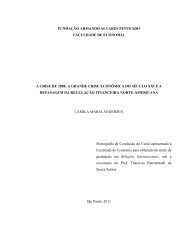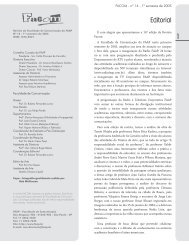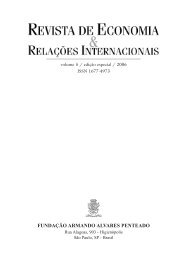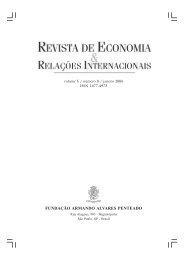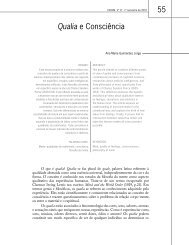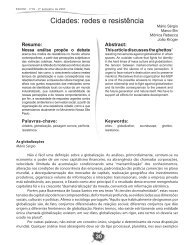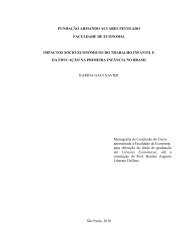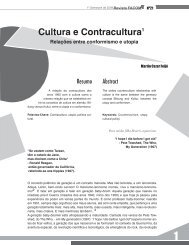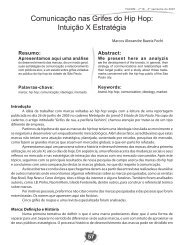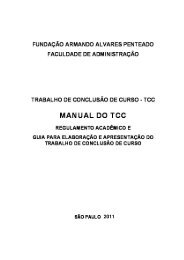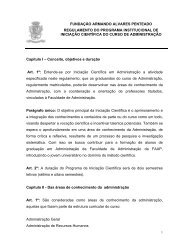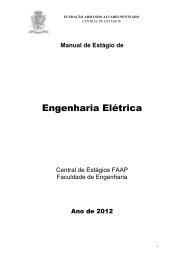GUIA DE ESTUDOS / STUDY GUIDE / GUIA DE ESTUDIOS - Faap
GUIA DE ESTUDOS / STUDY GUIDE / GUIA DE ESTUDIOS - Faap
GUIA DE ESTUDOS / STUDY GUIDE / GUIA DE ESTUDIOS - Faap
Create successful ePaper yourself
Turn your PDF publications into a flip-book with our unique Google optimized e-Paper software.
Guia de Estudos / Study Guide / Guia de Estudios<br />
AS TO THE 1986 AGREEMENT<br />
France did not breach the 1986 agreement due to the<br />
fact that these two agents were brought back to France<br />
only due to their health. Mr. Mafart returned to Paris on<br />
December 14, 1987 for medical treatment, and was apparently<br />
freed after treatment and Mrs. Prieur returned<br />
to France on May 6, 1988 because she was pregnant.<br />
AS TO THE RAINBOW WARRIOR CASE<br />
The issue of the sinking of the vessel Rainbow Warrior<br />
raises a question in international law over State responsibility.<br />
In such cases where a State sends its agents<br />
abroad to commit acts which are illegal under national<br />
law of the target country, it is customary for the State to<br />
take responsibility for the act and issue compensation. 26<br />
Because of this fact France argues that the Rainbow<br />
Warrior case bolsters the principle of non-intervention<br />
in international law and the punishment of States for<br />
contravening it. 27<br />
In terms of reparations, France initially paid to New<br />
Zealand 7 million USD, and paid a large compensation<br />
to the family of the only victim of the mission and to<br />
Greenpeace which was settled privately. 28<br />
APPLICABLE LAW<br />
The Court has the duty to decide, according to international<br />
law, problems and disputes between States<br />
and also, to give advisory opinions, based on the international<br />
law. When deliberating, the ICJ will make that<br />
international law is used to reach a decision. It is very<br />
important to state that the ICJ will not make its decisions<br />
based on internal laws, meaning that the Court<br />
will not decide a matter based on the national law of a<br />
specific country.<br />
According to article 38 of the Statute of the International<br />
Court of Justice, 29 The Court, whose function is<br />
to decide in accordance with international law such disputes<br />
as are submitted to it, shall apply:<br />
a. international conventions, whether general or particular,<br />
establishing rules expressly recognized by the<br />
contesting states;<br />
b. international custom, as evidence of a general practice<br />
accepted as law;<br />
c. the general principles of law recognized by civilized<br />
nations;<br />
d. subject to the provisions of Article 59, judicial decisions<br />
and the teachings of the most highly qualified<br />
publicists of the various nations, as subsidiary means<br />
for the determination of rules of law.<br />
This article is an exemplificative list of sources of law<br />
that may be used by the Court, when deliberating on<br />
an issue. There are a few enumerated in the article, but<br />
there are other sources to international law that can<br />
be also used to decide a case. The ones that the article<br />
listed are the most common ones used, though.<br />
The first source that the Statute brings is international<br />
conventions, which are agreements made between<br />
States on a specific theme. Conventions are also<br />
known as treaties, which are elaborated by the signatory<br />
States that want to create such treaty. Treaties may<br />
be used by the Court as a source of law because they<br />
symbolize a State’s position on that specific matter.<br />
International custom, the second source listed by the<br />
Statute, is a “general practice accepted as law”, 30 meaning<br />
that to be considered a custom, there has to be an<br />
act that is practiced generally by the population of a<br />
specific State, and the people who practice it, have to<br />
understand its importance and see it as being a law. A<br />
type of law, however, that if not observed will not have<br />
any legal consequences or sanctions.<br />
General principles of law may be also applied by the<br />
ICJ in the cases presented to it. The principles are aspects<br />
of law that are not written in any text of law; they<br />
are used as law but are not formally written anywhere.<br />
The last examples given by the Statute are the more<br />
general ones. The Statute says “subject to the provisions<br />
of Article 59, judicial decisions and the teachings of the<br />
most highly qualified publicists of the various nations, as<br />
subsidiary means for the determination of rules of law.” 31<br />
83




